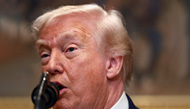MUNICH - Reinhard Siekaczek was half asleep when his doorbell rang early one morning two years ago. He peeked out his bedroom window, hurried downstairs and opened the front door. Standing before him were six police officers and a prosecutor. At that moment, Mr.Siekaczek, a former accountant for Siemens A.G., the German engineering giant, knew his secret life had ended.“I have been expecting you,”he told the officers.
To understand how Siemens ended up paying $1.6 billion, the largest fine for bribery in modern corporate history, it’s worth delving into the story of Mr.Siekaczek, one of several people who arranged a torrent of payments to well-placed officials around the globe.
From 2002 to 2006, he says, he oversaw an annual bribery budget of $40 million to $50 million. The payments, he says, were vital to maintaining Siemens’s competitiveness overseas, particularly in his subsidiary, which sold telecommunications equipment.
Siemens is hardly the only corporate giant under scrutiny by prosecutors. Three decades after the United States enacted a law barring American companies from paying bribes overseas, authorities around the world are bearing down on major enterprises like Daimler and Johnson & Johnson. But the Siemens case is notable for its breadth, the sums of money involved and the organizational zeal with which the company used bribes to secure contracts.
It is also a model of something that was once extremely rare: cross-border cooperation among law enforcement officials. German prosecutors opened the case in 2005. American authorities became involved in 2006 because Siemens shares are traded on the New York Stock Exchange. In its settlement with the United States government, Siemens pleaded guilty to violating the Foreign Corrupt Practices Act, which outlaws bribery abroad.
Mr.Siekaczek’s unit paid more than $800 million of the $1.4 billion in illegal payments that Siemens made from 2001 to 2007, including $5 million to win a mobile phone contract in Bangladesh and $12.7 million in Nigeria.
In Argentina, a different Siemens subsidiary paid at least $40 million in bribes to win a $1 billion contract to produce national identity cards. In Israel, the company provided $20 million to senior government officials to build power plants. In Venezuela, it was $16 million for urban rail lines. And in Iraq, $1.7 million to Saddam Hussein and his cronies.
Siemens began paying bribes long before Mr.Siekaczek applied his accounting skills to the task of organizing the payments. After World War II left the company shattered, it turned to markets in less developed countries, and bribery became a reliable sales technique.“Bribery was Siemens’s business model,”said Uwe Dolata, the spokesman for the association of federal criminal investigators in Germany.
Once, paying off a foreign official was not a criminal offense in Germany. In February 1999, Germany joined the international convention banning foreign bribery. Rather than comply with the law, Siemens created a toothless internal system that did little to punish wrongdoers, according to court documents. Inside Siemens, bribes were referred to as “NA” - an abbreviation for “nutzliche Aufwendungen,” which means “useful money.”
Managers in the telecommunications group decided to deal with the possibility of a crackdown by making its bribes more difficult to detect. They turned to Mr.Siekaczek, a man known for his personal honesty and deep company loyalty.“It had nothing to do with being law-abiding, because we all knew what we did was unlawful,”he said. “What mattered was that the person put in charge was stable and wouldn’t go astray.”
Mr.Siekaczek set things in motion by moving money to Liechtenstein and Switzerland, where bank secrecy laws provided greater cover. He also reached out to a trustee in Switzerland who set up front companies to conceal money trails from Siemens.
The scheme began to collapse when investigators in several countries began examining suspicious transactions. Prosecutors in Italy, Liechtenstein and Switzerland asked their German counterparts for help. German officials then decided to act. On November 15, 2006, the day the police knocked on Mr.Siekaczek’s door, other officers swept across Germany, into Siemens’s headquarters and several executives’homes.
All told, Siemens will pay more than $2.6 billion: $1.6 billion in fines and fees and more than $1 billion for internal investigations and reforms. But it still faces legal uncertainties. American and German officials said investigations were continuing.
Mr.Siekaczek has been sentenced to two years’probation and a $150,000 fine. He is uncertain about the impact of the Siemens case. After all, he noted, bribery and corruption are still widespread.
“People will only say about Siemens that they were unlucky and that they broke the 11th Commandment,”he said.“The 11th Commandment is:‘Don’t get caught.’”
스마터리빙
more [ 건강]
[ 건강]이제 혈관 건강도 챙기자!
[현대해운]우리 눈에 보이지 않기 때문에 혈관 건강을 챙기는 것은 결코 쉽지 않은데요. 여러분은 혈관 건강을 유지하기 위해 어떤 노력을 하시나요?
 [ 건강]
[ 건강]내 몸이 건강해지는 과일궁합
 [ 라이프]
[ 라이프]벌레야 물럿거라! 천연 해충제 만들기
 [ 건강]
[ 건강]혈압 낮추는데 좋은 식품
[현대해운]혈관 건강은 주로 노화가 진행되면서 지켜야 할 문제라고 인식되어 왔습니다. 최근 생활 패턴과 식생활의 변화로 혈관의 노화 진행이 빨라지고
사람·사람들
more
‘러브인뮤직’ 2025 성탄 음악회 성료
러브인뮤직은 지난 20일 LA 동양선교교회(담임 김지훈 목사)에서 가진 2025 성탄 작은 음악회를 끝으로 각 지역 봉사처별 올해 활동을 마무…

한인 향군 단체들 ‘진짜사나이’ 송년 행사
6·25 참전유공자회(회장 이재학)와 육군협회(회장 최만규)가 공동 주최한 2025 ‘진짜사나이’ 송년모임이 지난 19일 LA 용궁식당에서 한…
“취미생활로 다진 친목… 선후배들과 만든 모교사랑…
사진러브한인 사진 동호회 사진러브(회장 크리스 고)는 13일 용수산에서 송년모임을 갖고 한 해를 마무리하는 뜻깊은 시간을 가졌다. 이날 모임에…
[홀인원] 이상원 박사
일반외과 전문의 이상원(왼쪽) 박사가 지난 9일 뉴포트비치 소재 골프장 9번 홀(152야드)에서 레스큐 클럽으로 친 샷이 그대로 홀에 빨려 들…
[송년행사 게시판] 재미시인협회
재미시인협회(회장 지성심)는 오는 20일 오후 4시 가든스윗호텔에서 한 해를 마무리하며 동인지 ‘외지’ 제35집 출판 기념회와 ‘제23회 재미…
많이 본 기사
- 엡스타인 파일 파문 확산…정부 지연공개에 의회·피해자 공분
- 김건희특검, ‘로저비비에 선물’ 김기현 11시간 반 조사
- NASA국장 “달 착륙선 빨리 만드는 업체 택할 것”…경쟁 부추겨
- ICE 홈디포 급습단속에 한인 체포 4
- 트럼프 “마두로, 물러나는게 현명…강하게 나오면 그게 마지막”
- 젤렌스키, 마이애미 종전협상에 “실질적 결과에 매우 근접”
- ‘황금함대 구상’ 트럼프 “한화와 새 프리깃함 사업”…마스가 탄력
- 크리스티 놈 국토안보장관 “마두로 물러나야”…베네수엘라에 선명한 경고
- 美, 외국산 드론·부품 수입 금지…중국 DJI 등 전면 차단
- 텍사스서 ‘의료수송’ 멕시코 해군 소형 항공기 추락…최소 2명 사망
- 연말 ‘로드레이지’ 비극… 한인 총격 피살
- 美무역대표 “올해는 관세의 해…트럼프 무역정책 전망 밝다”
- 교내 말하기 대회 시상식 가져
- 성탄 연휴 폭우 ‘비상’ 주중 최대 6인치 온다
- ‘평양 무인기 침투 혐의’ 尹 구속 … 1
- 트럼프, 글로벌 제약사 약값 인하 발표
- “트럼프에 기부하고 공직발탁·사면·사업혜택”…이해충돌 논란
- “AI 아님” 이병헌♥이민정, 부부가 나란히.. ‘미담’ 터졌다
- 한인 박찬영씨 교통시비 총격 사망...타코마중앙장로교회 40대 장로, 19일 레이시 도로서 참변
- 파라마운트, 워너 인수전 총력… “CEO 부친 엘리슨이 보증”
- ‘탄소배출권 수익’으로 서민주택 대거 공급
- 운전중 시비 끝에 총 맞아 40대한인 사망
- 희대의 박나래 사태, 쌍방 고소전으로..법적 절차 본격화
- 애난데일 인근 I-495에서 28중 추돌사고, 8명 부상
- 이번엔 배터리부품·변압기?…美 철강·알루미늄 관세 확대 우려
- “엔비디아, 내년 2월 H200 中수출…美의원, 허가 공개 요구”
- ‘거액 탈세·통관 사기’ 한인 통관브로커 중형
- ‘결혼’ 신민아♥김우빈, 영화 한 장면 같네..본식 사진 공개
- 미 자동차 업계… 전기차 접고 내연차로 회귀
- 240만달러 투자사기로 호화생활 탕진...전 이스트사이드 부동산 에이전트 투자사기 유죄 평결
- 말살되고 있는 유럽의 성탄절 전통, … 1
- CBS, ‘이민자 추방’ 관련 보도 취소… ‘트럼프 눈치보기’ 비판
- 맥도널드 주차장서 싸움 끝 총격
- 뷔 ‘Winter Ahead’유튜브 뮤직 홀리데이 명곡 명예의전당 후보에..머라이어 캐리와 함께 올라
- 구글 알파벳 “데이터센터 확장”…인터섹트 47억5천만달러에 인수
- 박보검 미담 또 추가..이연복도 인정한 ‘다 가진 남자’
- 트럼프, 건강보험사들에 “보험료 내려… 1
- 내란재판부法, 본회의서 與주도 처리전망…정통망법 뒤이어 상정
- 기안84, 알고 보니 엘리트 집안? “외할아버지= 부산대 법대 출신”
- 미주한인 이산가족 북한 고향 길 열려
- 올해 메릴랜드 교도소 수감자 약 70명 숨져
- ‘마침내’ SD 송성문 초대박! ‘3+1+1년 2100만$’ 잭폿 터졌다... 특별한 인센티브 계약까지 공개
- 트럼프, 그린란드 특사 임명…덴마크, “영토 존중” 반발
- 고등학교 성적 인플레… SAT 점수 중요성 다시 부각
- ‘경악’ 오타니 골드카드 300만 달러에 낙찰! 슈퍼스타 위엄, KBO 최고연봉도 넘었다
- 트럼프 친구 사업가의 골프장, 세계 분쟁종식협상 무대돼
- “남의 묘비에 이름 새기는 것 같다”
- 외로운 이웃들
- 워싱턴 메트로지역 5세이하 아동인구 20년새 1.8%⇩
- 사사세 워싱턴 송년회
1/5지식톡

-
 미 육군 사관학교 West Poin…
0
미 육군 사관학교 West Poin…
0https://youtu.be/SxD8cEhNV6Q연락처:wpkapca@gmail.comJohn Choi: 714-716-6414West Point 합격증을 받으셨나요?미 육군사관학교 West Point 학부모 모…
-
 ☝️해외에서도 가능한 한국어 선생님…
0
☝️해외에서도 가능한 한국어 선생님…
0이 영상 하나면 충분합니다!♥️상담신청문의♥️☝️ 문의 폭주로 '선착순 상담'만 진행합니다.☎️ : 02-6213-9094✨카카오톡ID : @GOODEDU77 (@골뱅이 꼭 붙여주셔야합니다…
-
 테슬라 자동차 시트커버 장착
0
테슬라 자동차 시트커버 장착
0테슬라 시트커버, 사놓고 아직 못 씌우셨죠?장착이 생각보다 쉽지 않습니다.20년 경력 전문가에게 맡기세요 — 깔끔하고 딱 맞게 장착해드립니다!장착비용:앞좌석: $40뒷좌석: $60앞·뒷좌석 …
-
 식당용 부탄가스
0
식당용 부탄가스
0식당용 부탄가스 홀세일 합니다 로스앤젤레스 다운타운 픽업 가능 안녕 하세요?강아지 & 고양이 모든 애완동물 / 반려동물 식품 & 모든 애완동물/반려동물 관련 제품들 전문적으로 홀세일/취급하는 회사 입니다 100% …
-
 ACSL 국제 컴퓨터 과학 대회, …
0
ACSL 국제 컴퓨터 과학 대회, …
0웹사이트 : www.eduspot.co.kr 카카오톡 상담하기 : https://pf.kakao.com/_BEQWxb블로그 : https://blog.naver.com/eduspotmain안녕하세요, 에듀스팟입니다…
케이타운 1번가
오피니언
 옥세철 논설위원
옥세철 논설위원말살되고 있는 유럽의 성탄절 전통, 그 원인은…

외로운 이웃들
 조지 F·윌 워싱턴포스트 칼럼니스트
조지 F·윌 워싱턴포스트 칼럼니스트 [조지 F. 윌 칼럼] MIT에 대한 트럼프의 무분별한 공격
 전지은 수필가
전지은 수필가 ‘소명’이라 알아듣고
 최문선 / 한국일보 논설위원
최문선 / 한국일보 논설위원[지평선] 쿠팡의 “한국말 몰라요”

잇단 총격·테러 음모… 한인타운 안전 우려

2025년, 성찰과 감사의 마무리를
 김인자 시인ㆍ수필가
김인자 시인ㆍ수필가 [금요단상] AI와 동거, 그 실체
 한영일 / 서울경제 논설위원
한영일 / 서울경제 논설위원[만화경] 웰다잉 인센티브
1/3지사별 뉴스

빅애플 2025년 송년회
빅애플(대표 여주영)은 지난 19일 퀸즈 베이사이드 소재 산수갑산2 연회장에서 2025년 송년회를 열고 회원들간 화합과 친목을 도모했다. 이날…
재미 한인이산가족 상봉 길 열렸다

미주한인 이산가족 북한 고향 길 열려
“그리워하면 언젠가 만나게 되는…” 노래 가사처럼 그리워하면 다시 만날 수 있을까. 재미한인이산가족들은 그렇게 그리워하며 반세기가 넘게 기다리…
워싱턴 메트로지역 5세이하 아동인구 20년새 1.8%⇩

연말 ‘로드레이지’ 비극… 한인 총격 피살
연말을 맞아 도로 위에서 순간적으로 벌어진 운전 중 시비가 40대 한인 가장의 총격 피살 비극으로 이어졌다. 워싱턴주 레이시 경찰국과 서스턴 …
엡스타인 파일 공개 다음날 트럼프 사진 삭제…야당서 탄핵 경고

오늘 하루 이 창 열지 않음 닫기 



















































.png)


댓글 안에 당신의 성숙함도 담아 주세요.
'오늘의 한마디'는 기사에 대하여 자신의 생각을 말하고 남의 생각을 들으며 서로 다양한 의견을 나누는 공간입니다. 그러나 간혹 불건전한 내용을 올리시는 분들이 계셔서 건전한 인터넷문화 정착을 위해 아래와 같은 운영원칙을 적용합니다.
자체 모니터링을 통해 아래에 해당하는 내용이 포함된 댓글이 발견되면 예고없이 삭제 조치를 하겠습니다.
불건전한 댓글을 올리거나, 이름에 비속어 및 상대방의 불쾌감을 주는 단어를 사용, 유명인 또는 특정 일반인을 사칭하는 경우 이용에 대한 차단 제재를 받을 수 있습니다. 차단될 경우, 일주일간 댓글을 달수 없게 됩니다.
명예훼손, 개인정보 유출, 욕설 등 법률에 위반되는 댓글은 관계 법령에 의거 민형사상 처벌을 받을 수 있으니 이용에 주의를 부탁드립니다.
Close
x